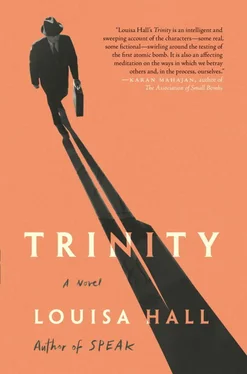And at the same time, he was agitated about the state of the arms race. He was desperately trying to persuade Truman not to test the first H-bomb.
But Truman wouldn’t see him, so Robert wrote letters.
One day, he’d write to Truman to try to persuade him that testing an H-bomb would cause environmental damage that could never be fixed. Then he’d write a letter to General Groves and say the use of an H-bomb could only ever be called genocidal. Then he’d wait a few days, and he wouldn’t hear back, so he’d launch a new tactic, and try to seem hard-line by urging somebody high up in the army to deploy more tactical nuclear weapons.
That was his strategy to get them to hold off on testing an H-bomb. He felt that the air force was the most bloodthirsty branch of the military: they wanted hydrogen bombs in their back pocket, but Robert didn’t trust them not to blow the whole planet to pieces. So then, working against them, he’d cozy up to the army, advocating tactical nuclear weapons in order to seem sufficiently hard-line and security conscious.
But then the following day, worked up into a lather by something hateful McCarthy said on TV, Robert would write some morally high-flying letter about freedom and transparency, and he’d vow to never testify against his former friends.
The following week, having received a disappointing response to his letter about not testing the H-bomb, and realizing that Eisenhower would probably beat Stevenson in the upcoming election, Robert would spin off a personal memo, considering the morality of testifying against somebody minor in exchange for confidence on the topic of H-bombs.
He didn’t like the idea of testifying, but he knew he’d go to prison if he pled the Fifth. He didn’t feel he could do much from prison.
Those were the gambles he weighed during those frantic months, when we paced around Princeton, smoking cigarettes, occasionally stopping for a few bites of a sandwich, and then, in November, Truman tested Ivy Mike, the first H-bomb, vaporizing the entire island of Elugelab, and blowing radioactive coral out of the water that fell on ships over thirty miles away from ground zero.
Three days later, Eisenhower beat Stevenson by a landslide.
Robert didn’t know what to do.
The day after Ivy Mike was exploded, he’d dictated a letter of protest, resigning from the Science Advisory Committee.
But the following day he asked me not to send it. He said he’d revised that idea. He was intent on retaining influence, in case Eisenhower won the election.
Then Eisenhower did win, and Robert had me tear up the letter. Then he dictated a report for the State Department’s disarmament panel, saying nuclear weapons on the scale of the H-bomb threatened all of civilization as we currently knew it.
Every day, there was a new letter. Sometimes the letters were at odds with one another.
He was, in other words, caught up in a panic. I recognized it at once. There was far too much bloody thread on the sampler.
AFTER EISENHOWER WAS ELECTED, LEWIS STRAUSS WAS THE FRONT-RUNNERfor chairman of the Atomic Energy Commission, and it was then that things began to get really heated.
Strauss hated Robert. There had been some insult at a birthday party, something as dumb and minor as that. Strauss, in addition, believed in absolute secrecy about anything having to do with nuclear weapons.
Robert believed it would all come out at some point, so why not open the box in the first place.
Several times, in various testimonies before various committees, Robert belittled Strauss’s position on nuclear secrets. Then, suddenly, magazines that had praised Robert since the end of the war began to print pieces with a different tone altogether.
Now they mentioned allegations of Robert’s connections to the Communists. They made personal insinuations. A former girlfriend was mentioned. She’d been a member of the CP. He’d gone to visit her in San Francisco, and later her suicide was reported, in the bathtub of a third-story apartment.
BY FEBRUARY OF 1953, WHEN I’D BEEN WORKING AT THE INSTITUTEfor four or five months, McCarthy was at the height of his powers, and Robert was persuaded that they were coming for him.
No matter what concessions he made, no matter which friends he agreed to testify against, no matter how forthrightly he supported deployment of tactical nuclear weapons, he felt he was doomed.
One day he’d decide to write an article for the Sunday Post, getting ahead of the thing. He’d say he was determined to reveal all the details of his associations in Berkeley, including the former girlfriend they’d mentioned.
But the next day he’d decide that there were some secrets he had a right to keep quiet.
And the next day he’d announce that he wanted to go back to teaching, and we’d dictate a memo about that.
But then he’d call me back into the office after I’d gone home to make dinner and dictate an entirely contradictory note, detailing twenty-one points for preventing nuclear warfare.
AT THE END OF THE MONTH, HE DELIVERED A SPEECH BEFORE Aclosed meeting of the members of the Council on Foreign Relations, urging an end to the secrecy that shrouded the arms race.
Secrecy, he said, could lead only to rumor, speculation, and ignorance.
“We do not operate well,” he said—and I know this because I helped him write it—“when the facts are known, in secrecy and fear, only to a few men.”
“Follies,” he said, “can occur only when even the men who know the facts can find no one to talk to about them, when the facts are too secret for discussion, and thus for thought.”
It was a direct attack on Strauss, and Strauss knew it. By May, when our walks around campus were warm enough that I had to start peeling off layers, sweating under my coat while I tried to keep up with Robert, Strauss had initiated a full-blown smear campaign against Robert.
He placed broadsides in Time, Life, and Fortune, attacking Robert directly. There were more questions about Robert’s friends and connections, more insinuations about his family background and about his potentially traitorous opposition to the hydrogen bomb.
In July, an armistice agreement in Korea was signed. A no-fly zone was established, though a peace treaty never got brokered.
In August, Strauss formally assumed chairmanship of the Atomic Energy Commission. Then the Russians tested the Sloika, and Robert’s position against testing more H-bombs started seeming weaker and weaker.
SOMETIMES, WALKING BEHIND ROBERT WHILE HE STRODE AROUNDcampus, the leaves on the trees having grown bigger and bigger until now finally they were enormous and tired, hanging there like big dusty green mittens, I wondered if he’d ever realized it was a new person walking behind him, not his usual secretary, taking notes while he dictated letters.
He was so caught up in Washington business that he didn’t seem able to see me, and for a while, in the early days of my new position, I wasn’t sure whether it was Robert or Stan who was more unaware of my existence.
It was as if I were disappearing, dwindling away, my whole life becoming as fine and bright and pointed as the thin line of light the sun makes when it’s almost slipped beyond the horizon.
It was such a pleasure. At night, I’d sit across from my husband, who ate his meatloaf and didn’t see me. And the next morning, I’d report for my duties at the institute, and there was Robert, looking right past me, asking me to follow him to the station while he dictated an important new memo.
Then I was down to ninety-nine pounds, and really, I was getting so happy.
SOMETIMES MY MIND RACED, I WAS SO HAPPY. THEN, IF I COULDN’Tsleep, I went to the kitchen to call home to my mother.
Читать дальше












